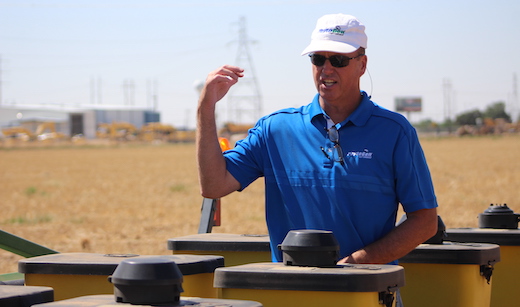YIELD PROTECTION PLAYS A KEY ROLE IN WEST TEXAS COTTON ACRES
As producers make variety decisions for the 2023 season, cotton agronomists say newer cotton varieties offer better protection for more consistent yield potential.
As producers make variety decisions for the 2023 season, cotton agronomists say newer cotton varieties offer better protection for more consistent yield potential.
Raising cotton in West Texas takes a certain amount of grit, and a tenacity that pushes to squeeze pounds and profit from every acre.
As producers make variety decisions for the 2023 season, cotton agronomists say newer cotton varieties offer better protection against perennial pests for more consistent yield potential. Genetic traits protect roots and plants to help growers get more from their cottonseed.
Scott Fuchs, PhytoGen cotton development specialist in West Texas, said recent advances in PhytoGen® W3FE varieties help stabilize yield potential when pests move into a cotton field. Because these traits come in elite germplasm, producers don’t have to choose between yield potential and yield protection — they can have both.
“Producers get trial-winning yield potential with newer PhytoGen W3FE varieties, and these varieties are loaded with protection against pests such as reniform nematode, root-knot nematode, verticillium wilt and bacterial blight,” Fuchs said. “With these native traits, the protection doesn’t wear off over time, like a seed treatment or in-season application. You get protection all season long, from planting until harvest.”
Fuchs said these traits can substantially improve yield potential in fields with heavy pest pressure, but they also help stabilize yields in fields with the occasional trouble spot. When pushing to maximize cotton production, every advantage adds up.
“We’ve worked with producers who could not profitably grow cotton because their reniform or root-knot nematodes were so bad, but they were able to beat nematodes and regain yield potential by planting PhytoGen W3FE varieties with built-in resistance,” Fuchs said. “With lower nematode populations — such as a few hot spots throughout a field — producers are able to stabilize yield potential across their farms.”
In 2021, Texas A&M AgriLife Research and Extension conducted a reniform variety trial in Lubbock and a root-knot variety trial near Acuff. The top four varieties in the reniform trial were PhytoGen® W3FE varieties, with PhytoGen® brand PHY 332 W3FE beating the closest competitor by 215 lb./A. PhytoGen® brand PHY 400 W3FE and PhytoGen® brand PHY 411 W3FE had the top two yields in the root-knot variety trial.1
Fuchs said PhytoGen cottonseed has a full variety portfolio for West Texas, with maturities and breeding traits well suited to the varying conditions from San Angelo to Lubbock to Amarillo. An increasing number of producers across the state are finding success with PhytoGen brand varieties. In fact, for the last two years, PhytoGen® cottonseed has had the No. 1 most-planted variety in Texas.2

Scott Fuchs, PhytoGen cotton development specialist, says PhytoGen® brand varieties offer genetic protection against key cotton pests to help growers protect yield potential on West Texas cotton acres.
“This is an exciting time for PhytoGen cottonseed, especially here in Texas,” Fuchs said. “We’re getting more and more calls from growers as we get closer to final variety decisions, and we’re here to help producers however we can.”
One question the PhytoGen team regularly fields is, “Will the Enlist weed control system work in West Texas?” The team answers with a resounding “YES” — and they did the field work last season to back it up.
Ken Legé, Ph.D., another PhytoGen cotton development specialist in West Texas, worked with Fuchs and the PhytoGen team last season to showcase the Enlist® weed control system at the Southwest Experience Center in Lubbock.
Demonstrations at the site showcased the near-zero volatility and reduced physical drift with Enlist® herbicides, when applied according to the label. The team chronicled the success of Enlist herbicides in a video available for producers.
“In our Enlist application demonstration, we showed that Enlist herbicides stay on target when applied according to the label, and they do not secondarily move after application,” Lege said. “Even in West Texas, the windiest place in the Cotton Belt, you can successfully apply Enlist herbicides. We’re excited to give West Texas producers more tools to manage weeds, along with the proven yield potential of PhytoGen cottonseed.”
To learn more how PhytoGen W3FE varieties can help you overcome challenges this season and for the future, get yield data and variety information at PhytoGen.com/facts.
1 Cotton Diseases Report, 2021. Texas A&M Research and Extension Center, Lubbock, Texas. https://lubbock.tamu.edu/files/2022/01/Cotton-Disease-Report-2021-1-1.pdf
2 2022 Kynetec Research FarmTrak.
Find information on yield and more in the PhytoGen Cottonseed Agronomy Library.